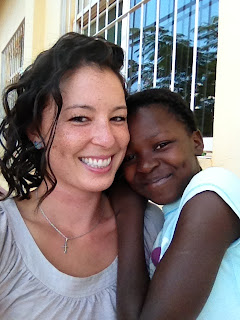Back where I belong!
Yesterday
I had my laptop, so I started showing the girls pictures from my first two
years here, particularly my first year. They thought it was so funny to see
everyone’s baby-faces—the way I remember them. It’s really incredible how much I’ve
seen some of them grow up.
I went into town today to meet
Jasmin for lunch. The cement wall around the soccer field that we painted 1.5
years ago with our REDES girls has partly fallen down now (the day our young
girls forced through singing and chanting the group of cocky men soccer players
off their field, it will always be one of the greatest moments of my life). I
guess the crumbling cement blocks couldn’t withstand the huge amounts of rain
Inharrime has had this year.
Before meeting Jasmin I went into
the market to say hi to our two friends there who we always bought our vegetables
from. One of these girls was the one who was incredibly pregnant last year, but
wouldn’t “tell” me she was pregnant, so I wasn’t culturally allowed to talk to
her about it. She happily told me today that her daughter was born in December
and is healthy and doing well!
The amount of development and
changes in the town of Inharrime since I lived here, or even since I last
visited in early November, is pretty unbelievable. Apparently Inharrime has a
new administrator who seems to be really proactive about developing and
cleaning up the town. The main streets used to be crowded with vendors selling
everything from fruits, to grilled corn-on-the-cob, to sandals, but now all
these people have been herded to designated locations. The bus rank has been
cleared out and fenced off. One of the iconic symbols of Inharrime—a shop/bar/restaurant
that operated out of a metal trailer—has been removed, and the park area it
occupied fixed up. But aside from the proactive local government, you see signs
of development and growth in the many shops and houses that have been renovated
or fixed up, or the new shops that have opened.
Another bit of reflection, or just
thoughts I didn’t get to write from Swaziland. I’m not sure if it was that
where I was living in Swaziland was more rural than where I lived in
Mozambique, or if it’s a difference in countries/cultures, but I found Swaziland
to be much more “traditional.” There is one albino boy at the hostel in
Swaziland. He doesn’t actually fit the normal criteria for kids who are
admitted into the hostel in terms of his family and their resources, but he is
there because his family can’t properly protect him. It is a traditional belief
that body parts from albinos have extra powers in witchcraft, so people try to
kidnap him in order to sell him to a traditional healer for a very high price.
This happened multiple times in the short time I was there. I have heard of
this belief before, but I heard of it as if it were folklore, I never heard of
anything like that actually happening. Albino people in Mozambique are
sometimes ostracized or treated poorly, but nothing like this. Also recently baby
D’s paternal family emerged from nowhere to try to claim her. We are now
helping to facilitate talks between the paternal and maternal sides, as well as
social welfare. One of our staff mentioned that the time of ritual killings is
approaching, so we need to ensure that their motives for wanting her are pure. I
have never heard of anything like this while living in Mozambique either. And
this isn’t just me, I asked some Moz PCVs and they were equally surprised by
these things.
This brings me to another thing that
has been on my mind: how strange it is that worlds can change with the simple
crossing of an arbitrary line. Perhaps this doesn’t sound as weird to someone
who didn’t grow up in America (or in the middle of America), but I find it
truly strange that I could live in Swaziland less than 200km from where I lived
in Namaacha last year, yet be in an entirely different world. Sure, in the
States the crossing of an arbitrary line can affect the time, where and when
you can buy alcohol, and who you can marry. But here we cross the border and
suddenly everything changes: the language, the ethnic group (Swazis are largely
one ethnic tribe). In Swaziland, like like many African countries, wealth is
counted in cattle, so there are large herds of cattle everywhere, but this is
not true of Mozambique*. In Swaziland, there is a familial homestead. Their traditional
marriage customs are hugely different. In Mozambique every woman wraps a capulana
around her waist in almost every setting—Swazi women don’t. Even something as simple
and stupid as this: Beth loves to bake, but has been unable to find a good graham
cracker substitute for crusts. I suggested Maria biscuits, assuming they would
be as prolific in Swaziland as they are in Mozambique, but you can’t find them
in Swaziland. In Mozambique at every single little selling stand (a small table
beside the road where a lady or young kid sits selling phone credit, a
saltine-type crackers, little sweets, and Maria biscuits. These are the basics,
if you’re lucky they might have other items in addition) has them.
*disclaimer:
all this is true for southern Mozambique, I know nothing about the central and
north.
.JPG)
.JPG)
.JPG)
.JPG)



.JPG)
.JPG)
.JPG)
.JPG)












.JPG)
.JPG)
.JPG)

